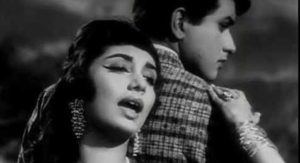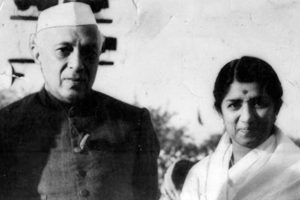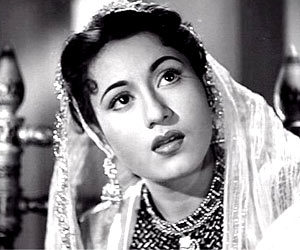Songs made these days do not last for long: Lata Mangeshkar
By Manju Mittal
Lata Mangeshkar is a living legend of Bollywood playback singing. Lata, by calling her melody queen or malika-e-tarranum we honour her, as she has ruled our hearts for more than five decades. And she still does. Fondly addressed as Lata didi by the Mumbai fraternity and dubbed as the Nightingale of India, Lata is a name that makes us think and feel music, the nostalgia she creates in us all from young to the old.
I have always wanted to write about Lata didi’s musical journey so that today’s generation know about Indian music and how it has evolved through the ages. Lata’s voice creates a magical atmosphere as every listener all over the world identifies with her and her contribution to Indian music. She is an epic and a living legend, who is synonym with music and melody. Lata! ”˜tumhari awaaz hi pehchaan hai’.
Lata Mangeshkar has been awarded the Bharat Ratna, Padma Bhushan, Padma Vibhushan, Dadasaheb Phalke award and multiple National film awards. Hailing from Indore, Madhya Pradesh, Lata Mangeshkar has been singing professionally from the age of 13, she has lent her voice to four generations of heroines – an unparalleled and iconic phenomenon of Hindi Cinema.
After trying for an interview with the legend almost 3 months, fate finally knocked on my door. I was overjoyed when she agreed to do a telephonic interview on 16th March 2017 when I called her at her residence in Mumbai, it was a breathless moment. Time stood still with the legendary voice ”˜Namaskar Kaisi hai aap’ as my receiver came alive. Oh my God she is there at the other end of line I quickly got over my goose-bumps and got into conversation straight away. We had a heart to heart cosy conversation. Lata didi blissfully regaled me in her most candid interview in which she tells all about her singing career, her interests and much more:
What is the biggest difference between music now and when you began your career in singing many years ago, what do you have to say about today’s songs?
There is a big difference between what I sang earlier and what is being made now, I am not saying this new music is bad but there are too many beats. The Sur ( notes ) and Kavita ( Poetry ) are also not as good. Everything is different and fairly strange today as compared to the golden days. New songs don’t last for long in our minds. Many mainstreams songs made nowadays are meaningless. The earlier songs had a lot of meaning. Lyrics made sense and tunes had more melody. I feel they were composed from the heart. Older songs are classics and have lived on forever. I remember with musicians like Madan Mohan, SD Burman, Jaidev, Salil Chowdhary, we would sit and rehearse one song for days and this was when there were 8- 9 songs in every film. That sense of camaraderie is denied to today’s singers.
Lata didi, you were very selective with your songs, tell us more about it.
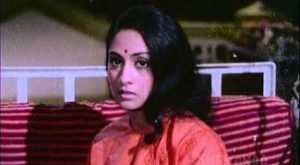 Songs in those days were very good songs so there was no question of choosing yet composers always kept my preferences in mind, what I was comfortable, with, the lyrics and the tunes. They always gave me songs that kept my voice and skills in mind. I always made sure the words were not cheap and also the tune was within my comfort zone. I am meant for softer, romantic songs. I just couldn’t connect with cabaret kind of songs.
Songs in those days were very good songs so there was no question of choosing yet composers always kept my preferences in mind, what I was comfortable, with, the lyrics and the tunes. They always gave me songs that kept my voice and skills in mind. I always made sure the words were not cheap and also the tune was within my comfort zone. I am meant for softer, romantic songs. I just couldn’t connect with cabaret kind of songs.
You have sung for so many actresses from Madhubala to the new generation actresses, how do you feel?
I feel good that I have lent my voice to four generations of heroines and I must say they have done justice to my songs.
Lata didi, ”˜Ae mere watan ke logo’, is a song that brought tears to our late Prime Minister Pandit Jawahar Lal Nehru in 1962, how was the experience?
Initially I did not know ”˜Ae mere watan ke logo’ will become so popular when I sang the song as part of Republic Day celebrations in front of Pandit Nehru 53 years ago, he was very sad over the India-China war and he looked downcast, I had not imagined that my song will acquire an iconic status and become hugely popular in the country and also abroad. The song was composed by C Ramachandra, in honour of Indian soldiers who lost their lives in the 1962 war with China.
What’s the secret of your magnificent soulful voice?
( Laughs ) My voice is a gift from god and my parents. Their love and respect is my biggest reward. God has given me more than I deserve, it is my parents’ blessings and God’s kindness. I always say whatever skills I have imbibed are god’s gift.
Whether it was ”˜Pyar kiya to darna kya’ from Mughal-e-Azam or ”˜Lag ja gale’ or ”˜Baahon mein chale aao’, your renditions have touched generations of music lovers, Lata didi tell us about your favourite song?
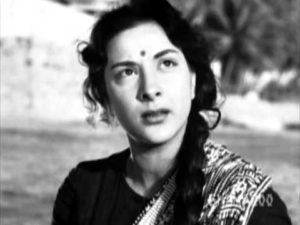 It is a difficult thing to do, and an equally difficult question ( laughs ) I can’t recollect my favourites very easily, I must say all songs are close to my heart. In those days apart from having great musicians we had amazing songwriters, that’s why old songs are evergreen, Music in those days used to be very important.Mujhe Naushad ji ke gaane, kucch Salil Chowdhary ji ke, kucch Shankar Jaikishan ji ke hain, Kucch Madan Mohan ji ke hain, Jaidev ji ke, ek gaana kehna mushkil hai. Rafi saab, Kishore da, Mana Dey, Mukesh, Asha – they were all so inspiring and motivating, they had their own style. We all learnt while we worked.
It is a difficult thing to do, and an equally difficult question ( laughs ) I can’t recollect my favourites very easily, I must say all songs are close to my heart. In those days apart from having great musicians we had amazing songwriters, that’s why old songs are evergreen, Music in those days used to be very important.Mujhe Naushad ji ke gaane, kucch Salil Chowdhary ji ke, kucch Shankar Jaikishan ji ke hain, Kucch Madan Mohan ji ke hain, Jaidev ji ke, ek gaana kehna mushkil hai. Rafi saab, Kishore da, Mana Dey, Mukesh, Asha – they were all so inspiring and motivating, they had their own style. We all learnt while we worked.
Other than music, what are your interests?
I love reading books and clicking pictures. Though photography is my passion, nowadays I have stopped clicking pictures because I do not understand the functioning of a digital camera, I don’t like coloured pictures, I used to like my old black and white camera.
What advice would you like to give to young singers?
I think playback singing has a lot to do with voice acting, I would suggest to all the youngsters to understand the character, situation and the story behind the songs. That is when you can add soul to the rendition which, I think, is missing in today’s music. They must learn classical music and they must not get carried away by overnight success. Humility is the key to longevity. Spare some time to understand Indian classical music. I keep telling singers of today that it is very important to have knowledge of classical music first otherwise you are just singing for the sake of singing.
What is your message to your fans in Australia?
Always respect your parents, elders, Guru ( Teachers ), do not forget your motherland India. “Main aap sabki bahut shukar guzaar hun” ( I am thankful to all of you ) and I am happy that even today you all have kept me in your hearts. The love that I have received from my well-wishers and fans, ”˜Yeh bhagwan ki kripa hai mujh par’ ( it’s all by god’s grace ) that I still continue to get this kind of affection. I request everyone “Love each other, care for each other live with peace and harmony so you can make the world more beautiful”.
I am still pinching myself whether I talked to Lataji that night and have listened to her tape again and again only to make sure. Lataji was comfortable, her magical voice as sweet as ever and she gave a larger perspective about cinema and music of her time. Let’s all pay a living tribute to a great artiste, Lata Mangeshkar, a very humble, encouraging and a dedicated person.
Short URL: https://indiandownunder.com.au/?p=8551


